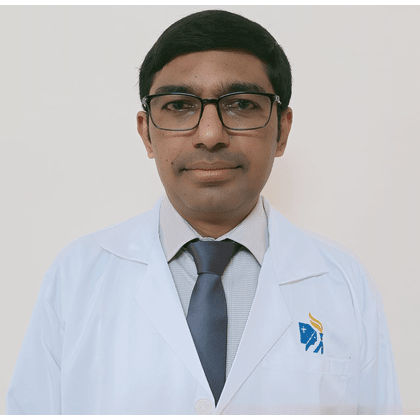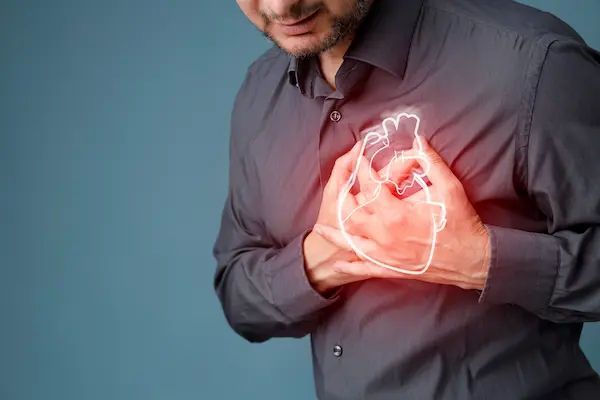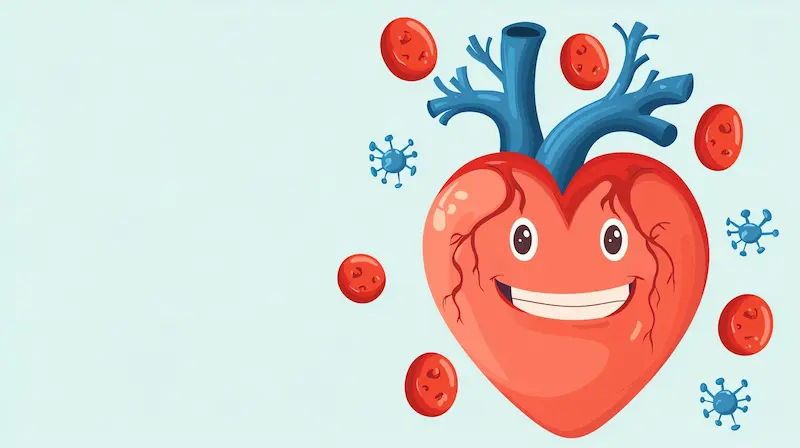Your Complete Guide to Cardiac Surgery and CTVS Care
Learn everything about cardiac surgery and CTVS—from coronary bypass and valve repair to minimally invasive procedures, recovery, risks, and life after surgery.

Written by Dr. M L Ezhilarasan
Reviewed by Dr. Shaik Abdul Kalam MD (Physician)
Last updated on 13th Jan, 2026

Introduction
Facing the prospect of cardiac surgery can be an overwhelming experience filled with questions and concerns. The field of cardiothoracic and vascular surgery (CTVS) is a sophisticated medical specialty dedicated to treating diseases of the heart, lungs, oesophagus, and major blood vessels. This guide is designed to demystify the process, from understanding why these procedures are necessary to what you can expect during recovery. We will explore the different types of surgeries, the world-class team that performs them, and how modern advancements have made these operations safer and more effective than ever. Whether you're seeking information for yourself or a loved one, our goal is to provide you with clear, compassionate, and comprehensive knowledge to help you navigate this journey with greater confidence and peace of mind.
What is Cardiothoracic and Vascular Surgery (CTVS)?
Cardiothoracic and vascular surgery, often abbreviated as CTVS, is a specialised branch of medicine that focuses on the surgical treatment of conditions affecting organs inside the thorax (the chest), primarily the heart, lungs, and the body's network of major blood vessels (the vascular system). This field is typically divided into three main sub-specialties: cardiac surgery (heart), thoracic surgery (lungs, oesophagus, chest wall), and vascular surgery (arteries and veins). These surgeons are highly trained to perform complex procedures that can save lives and dramatically improve their patients' quality of life. The decision to proceed with surgery for heart disease is never taken lightly and is always made collaboratively by a multidisciplinary team of experts after careful evaluation of all other options.
Consult a Specialist for the best advice
Common Conditions Requiring Cardiac Surgery
Cardiac surgery addresses a wide range of serious heart conditions. The most common reasons include:
Coronary Artery Disease (CAD): This occurs when the arteries that supply blood to the heart muscle become hardened and narrowed due to a buildup of plaque. This can lead to chest pain (angina) or a heart attack. Coronary artery bypass grafting is a primary surgical solution.
Heart Valve Disease: Your heart’s four valves ensure blood flows in the correct direction. They can become damaged by stenosis (narrowing), regurgitation (leaking), or endocarditis (infection). This forces the heart to work harder, leading to heart failure.
Aortic Disease: The aorta is the body's main artery. It can develop aneurysms (dangerous bulges) or dissections (tears in the inner wall), both of which are life-threatening emergencies requiring urgent aortic aneurysm repair surgery.
Heart Failure: When the heart is too weak to pump blood effectively, surgical interventions like implanting ventricular assist devices (VADs) or even a heart transplant may be necessary.
Arrhythmias: For abnormal heart rhythms like atrial fibrillation that don’t respond to medication, a procedure called the Maze procedure can be performed to create scar tissue that blocks errant electrical signals.
Types of Cardiac Surgery Procedures
The specific type of procedure depends entirely on the patient's condition and overall health.
Open-Heart Surgery
This is the traditional approach, involving a large incision down the center of the chest to open the breastbone (sternotomy) and provide direct access to the heart. It is commonly used for complex procedures like multiple bypasses or valve replacements.
Minimally Invasive Cardiac Surgery
This modern approach uses several small incisions between the ribs instead of a large sternotomy. A tiny camera (thoracoscope) and specialised instruments are inserted, allowing the surgeon to operate with enhanced visualisation. Benefits include less blood loss, reduced pain, shorter hospital stays, and a faster recovery. It's often used for minimally invasive heart valve surgery and certain bypass operations.
Coronary Artery Bypass Grafting (CABG)
Often called "bypass surgery," CABG is one of the most common cardiac procedures. The surgeon takes a healthy blood vessel from another part of the body (like the chest, leg, or arm) and creates a new pathway, or "bypass," around the blocked coronary artery. This restores vital blood flow to the heart muscle.
Heart Valve Repair or Replacement
When a valve is damaged, surgeons will either repair it using the patient's own tissue or an annuloplasty ring, or replace it entirely. Replacement valves can be mechanical (made from durable materials) or biological (made from animal tissue or a human donor). The choice depends on the patient's age, health, and lifestyle.
Surgery for Aortic Aneurysms and Dissections
For a weakened section of the aorta, surgeons can replace it with a synthetic graft. This is often done through open surgery. For suitable candidates, a less invasive option called endovascular aortic repair (EVAR) is available, where a stent-graft is guided through the femoral artery to seal off the aneurysm.
Surgery for Heart Failure
For advanced heart failure, options include implanting a mechanical pump known as a left ventricular assist device (LVAD), which helps the heart pump blood, or a heart transplant, which replaces the failing heart with a healthy donor heart.
The Cardiac Surgical Team: Who's Who in the OR
A successful cardiac surgery is the product of a highly coordinated team effort. This multidisciplinary group includes:
Cardiothoracic Surgeon: The lead surgeon who performs the operation.
Cardiologist: Often involved in the diagnosis and management of the patient before and after surgery.
Anaesthesiologist: Administers anaesthesia and manages the patient's vital signs and pain control throughout the procedure.
Perfusionist: Operates the heart-lung bypass machine, which oxygenates and circulates the patient's blood while the heart is stopped during surgery.
Nurses and Surgical Technicians: Assist the surgeon, manage instruments, and ensure a sterile and efficient operating environment.
The Patient Journey: From Diagnosis to Recovery
Pre-Operative Evaluation and Preparation
Before surgery, you will undergo a thorough evaluation, including blood tests, imaging scans (like echocardiograms or angiograms), and a review of your medical history. This is the time to discuss all medications with your doctor and to follow instructions on fasting before the procedure. Preparing for heart surgery also involves lifestyle adjustments like quitting smoking.
What to Expect on Surgery Day
The procedure will take place in a dedicated operating room. After anaesthesia is administered, the surgical team will begin. The length of surgery varies widely, from 3-4 hours for a simple procedure to 6+ hours for complex operations.
Post-Operative Care in the ICU
You will initially wake up in the Intensive Care Unit (ICU) for close monitoring. You will have tubes and wires in place to assist with breathing, drain fluids, monitor your heart, and deliver medication. This is a normal part of the process.
The Road to Recovery: Hospital and Home
After a day or two in the ICU, you'll move to a step-down unit. The focus shifts to managing pain, beginning physical therapy, and educating you on post cardiac surgery care.
Risks and Benefits of Cardiac Surgery
Like any major surgery, cardiac procedures carry risks, including bleeding, infection, blood clots, irregular heart rhythms, stroke, and reactions to anaesthesia. However, it's crucial to weigh these against the significant benefits. For most patients, the goal of surgery is to relieve debilitating symptoms (like chest pain and shortness of breath), prevent a heart attack or sudden death, improve quality of life, and ultimately prolong life. The risks and benefits of heart surgery are thoroughly discussed by your surgical team before obtaining your consent.
Advancements in CTVS: The Future is Now
The field of CTVS is constantly evolving. Key advancements include:
Robotic-Assisted Surgery: Provides surgeons with enhanced precision, flexibility, and control, making minimally invasive techniques available for more complex procedures.
Transcatheter Procedures: For patients who are high-risk for open surgery, techniques like TAVR (transcatheter aortic valve replacement) allow for valve replacement through a catheter in the groin, avoiding open-heart surgery entirely.
Hybrid Operating Rooms: State-of-the-art suites that combine advanced imaging technology with a traditional operating room, allowing for complex procedures that blend surgery and minimally invasive techniques.
Improved Biomaterials: Development of more durable and biocompatible materials for valves, stents, and grafts.
Life After Cardiac Surgery: Rehabilitation and Lifestyle
Recovery continues long after leaving the hospital. Cardiac rehabilitation is a medically supervised program that is a critical component of healing. It includes:
Exercise Training: To help you regain strength and stamina safely.
Education: On heart-healthy living, nutrition, and medication management.
Counselling: To help reduce stress and improve mental health.
Long-term success depends on adopting lasting lifestyle changes: eating a heart-healthy diet low in sodium and saturated fat, engaging in regular physical activity, taking medications as prescribed, and attending all follow-up appointments. If you experience new or worsening symptoms like chest pain, fever, or redness around your incision site, consult a doctor online with Apollo24|7 for immediate guidance or to book a physical visit for further evaluation.
Conclusion
The decision to undergo cardiac surgery is a significant one, but it is often a powerful step toward reclaiming your health and your life. Modern CTVS has made remarkable strides in safety, efficacy, and patient comfort. By understanding the conditions treated, the procedures available, and the dedicated team behind your care, you can approach this challenge with knowledge and confidence. Remember, the journey involves a partnership between you and your healthcare providers, from the initial diagnosis through surgery and the vital recovery period. Embrace the support available, commit to the recommended lifestyle changes, and look forward to the potential for a healthier, more active future. If you have more questions or need to discuss specific symptoms, don't hesitate to seek professional medical advice.
Consult a Specialist for the best advice
Consult a Specialist for the best advice

Dr. Tripti Deb
Cardiologist
40 Years • MBBS, MD, DM, FACC, FESC
Hyderabad
Apollo Hospitals Jubilee Hills, Hyderabad

Dr. Rakesh Gopal
Cardiologist
22 Years • “ Trained in Trans Aortic Valve Implantation ( TAVI ) from Mehmet Akif Ersoy Hospital Istanbul, Turkey “ & MD (General Medicine), FRCP (Glasglow)DNB( Cardiology), FESC, HICR Cert (Harvard University, USA), Angioplasty Training from Washington Adventist Hospital USA, Asan Medical Centre, Seoul Korea, Board certified in Cardio Oncology, ICOS- USA
Chennai
Apollo Hospitals Heart Centre Thousand Lights, Chennai
(100+ Patients)

Dr Gautam Naik
Cardiologist
12 Years • Senior ConsultMBBS, MD (General Medicine), DM (Cardiology), Interventional Cardiology Fellowship (Royal Papworth Hospital, Cambridge, UK), Structural Heart Intervention Fellowship (Barts Heart Centre, St Bartholomew's Hospital, London)
Delhi
Apollo Hospitals Indraprastha, Delhi
(50+ Patients)
Dr. Raman Puri
Cardiologist
29 Years • MD, DM
Delhi
Apollo Hospitals Indraprastha, Delhi

Dr. Vijayakumar Subban
Cardiologist
15 Years • MD, DM (Cardiology), FNB (Intreventional Cardiology), Fellowship in Interventional Cardiology (The Prince Charles Hospital, Brisbane, Australia), Fellowship in Intravascular Imaging and Physiology (Asan Medical Center, Seoul, Korea), Cardiac CT (SCCT- Level II), Cardiac MRI (SCMR- Level I)
Chennai
Apollo Hospitals Greams Road, Chennai
(150+ Patients)
More articles from Heart disease
Frequently Asked Questions
1. What is the difference between a cardiologist and a cardiac surgeon?
A cardiologist is a medical doctor who diagnoses and manages heart disease through medications, lifestyle advice, and non-surgical procedures (like placing stents). A cardiac surgeon (CTVS surgeon) is a specialist who performs operations on the heart and blood vessels. They work closely together to determine the best treatment plan for a patient.
2. How long does it take to fully recover from open-heart surgery?
While hospital discharge may occur in 5-10 days, full recovery is a gradual process. It typically takes 6-8 weeks to return to most normal activities and about 3-6 months to feel fully recovered, depending on the procedure and the individual. Participation in a cardiac rehab program significantly aids recovery.
3. Are there alternatives to open-heart surgery for valve replacement?
Yes, for patients with aortic stenosis who are at high risk for open surgery, transcatheter aortic valve replacement (TAVR) is a minimally invasive alternative. This procedure implants a new valve via a catheter threaded through an artery, often in the groin, without the need to open the chest.
4. What are the signs of infection after heart surgery?
Contact your surgeon or doctor immediately if you notice: fever over 101°F (38.3°C), increased redness, swelling, warmth, or pus-like drainage from your incision site, or if the incision reopens.
5. How long will I need to take blood thinners after surgery?
This depends entirely on the procedure. After a biological valve replacement, you may only need them for 3-6 months. If you receive a mechanical valve, you will need to take blood thinners (like warfarin) for life to prevent clots from forming on the valve. Your doctor will provide a specific plan for you. Apollo24|7 offers convenient home collection for necessary monitoring tests like INR to manage your medication dosage effectively.


